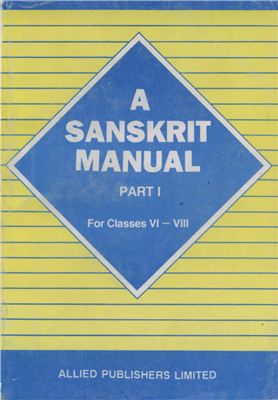Antoine R. A Sanskrit Manual for High Schools. Part I. - New Delhi:
Allied Publishers Limited, 2002. - 166p.
PREFACE
The purpose of this Manual is not to give an exhaustive treatment of Sanskrit grammar. It is meant as a practical method of teaching and leaing Sanskrit through the medium of English. Its composition is based on the two following principles :
1. The effort of memory which the study of languages demands becomes a mere drudgery when its rational usefulness is not clearly shown and immediately given practical scope. An instrument, however beautiful, remains cumbersome as long as it cannot be utilized.
2. The drudgery of memory work is amply repaid by the capacity which the student acquires of expressing himself in the language which he leas. That is why greater stress has been laid on translation from English into Sanskrit than on translation from Sanskrit into English.
This First Part covers the matter of the first three years (Standards IV to VI or Classes VI to VIII). The beginnings should be extremely slow. The vocabulary should be leat by small doses (five to eight) words a day) and frequent repetitions should be given.
The first ten lessons could conveniently form the syllabus of the first year. Their treatment is very analytical.
Lessons 11 to 26 are more compact and will require more time to be assimilated. They should be distributed over the second and third year.
In this seventh edition, besides correcting the few printing mistakes which had escaped our scrutiny, we have incorporated the valuable suggestion of colleagues and well-wishers.
R.A. , S.J.
PREFACE
The purpose of this Manual is not to give an exhaustive treatment of Sanskrit grammar. It is meant as a practical method of teaching and leaing Sanskrit through the medium of English. Its composition is based on the two following principles :
1. The effort of memory which the study of languages demands becomes a mere drudgery when its rational usefulness is not clearly shown and immediately given practical scope. An instrument, however beautiful, remains cumbersome as long as it cannot be utilized.
2. The drudgery of memory work is amply repaid by the capacity which the student acquires of expressing himself in the language which he leas. That is why greater stress has been laid on translation from English into Sanskrit than on translation from Sanskrit into English.
This First Part covers the matter of the first three years (Standards IV to VI or Classes VI to VIII). The beginnings should be extremely slow. The vocabulary should be leat by small doses (five to eight) words a day) and frequent repetitions should be given.
The first ten lessons could conveniently form the syllabus of the first year. Their treatment is very analytical.
Lessons 11 to 26 are more compact and will require more time to be assimilated. They should be distributed over the second and third year.
In this seventh edition, besides correcting the few printing mistakes which had escaped our scrutiny, we have incorporated the valuable suggestion of colleagues and well-wishers.
R.A. , S.J.

